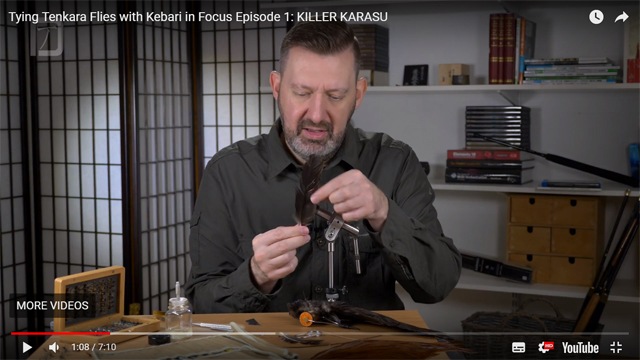Join Pro Fly Tier John Pearson for Episode 1 of Kebari in Focus
I’m delighted to let you in on the incredible demonstrations and insights that JP has been putting together on the REAL DEAL behind Japanese kebari tyings. It’s the perfect compliment (and way in) to the fishing presentation methods and fish behavioural triggers I explain in our book “How to Fool Fish with Simple Flies”.
CLICKING HERE (OR ON THE PICTURE BELOW) TAKES YOU RIGHT TO THE KEBARI IN FOCUS PAGE
In this series, JP will reveal and give the background to some of our favourite and most effective patterns that have come out of our travelling and interviewing experts at the source in Japan.
So go ahead and click on the picture to start adding killer fly patterns to your box.
PLUS, if you like the idea of spreading top quality video insights and tying demos revealing authentic Japanese principles of fly design through the western tenkara community, Go ahead and click your favourite social share buttons on this page.
There is WAY more to Japanese tenkara flies than reverse hackles (though they are fascinating too of course).
Paul
PS – If you are SOMEHOW not yet taking advantage of over a year’s worth of free email tuition to improve your success on stream and stay up to date with all our new developments – you should probably CLICK HERE to choose your location and start catching up.


This is a good looking, nicely tied and no doubt appetizing fly, but the method of strengthening the herl body with a rib is wrongly shown.
When the rib is wound in the opposite direction along the shank to the herl, as here, it should be wound in the same direction around it, and vice versa.
The way shown here does little to bind down and protect the herl body, and if the rib is at the same pitch as the herl, nothing.
Chris.
You are absolutely right about the spiral Chris (I often tie it the way you describe, largely by accident since it just makes it a bit easier to trap the fibres with the first turn of thread at the hook bend). In fishing practice, as long as you make your turns of thread slightly closer together than the turns of herl, the thread still grabs each fragment before it unwinds too far (as in the photo of one of JP’s used flies in the video).
Many thanks for your comment and sharing your insights, that’s exactly what our site and content is all about.
Paul
What is the difference between your e-Book and the coffee table book you’ve just published? Is the content identical,?
Hi Bryan, the words and pictures are basically the same – the interior page layout has been redesigned to improve the look for an 8” x 10” print version.
Thank you for checking it out,
Paul